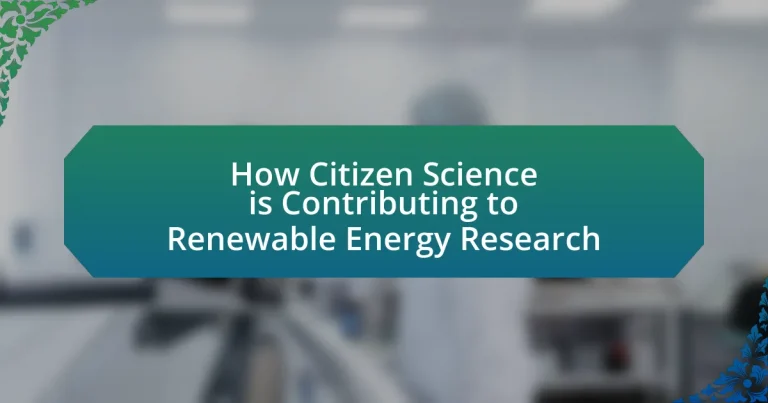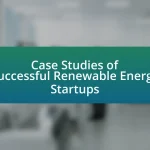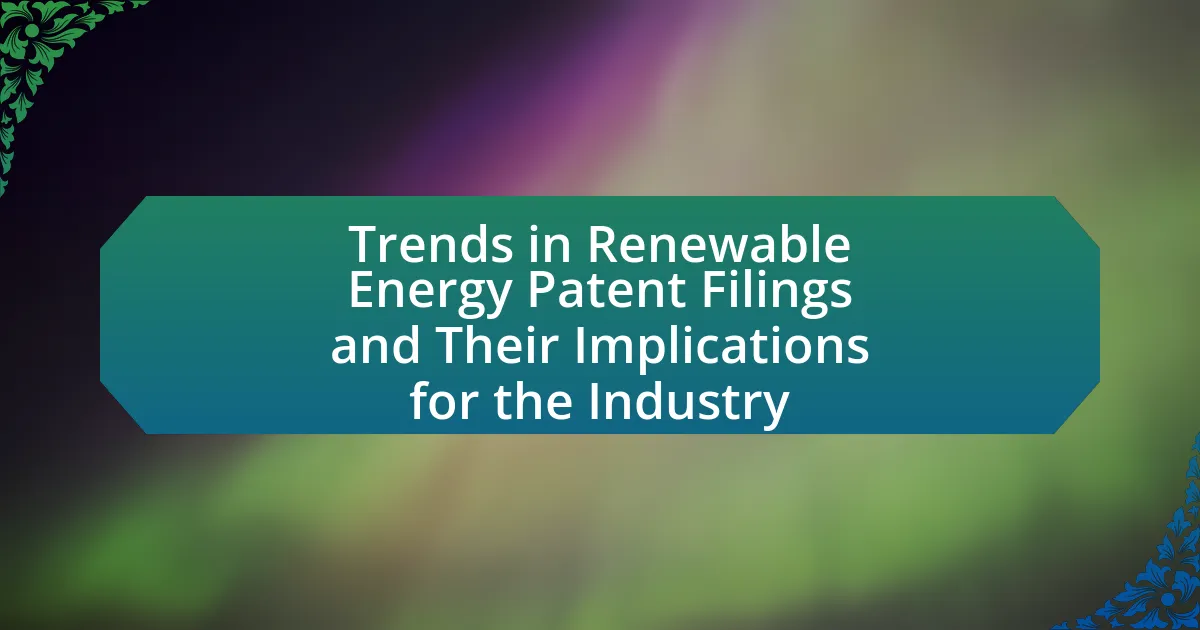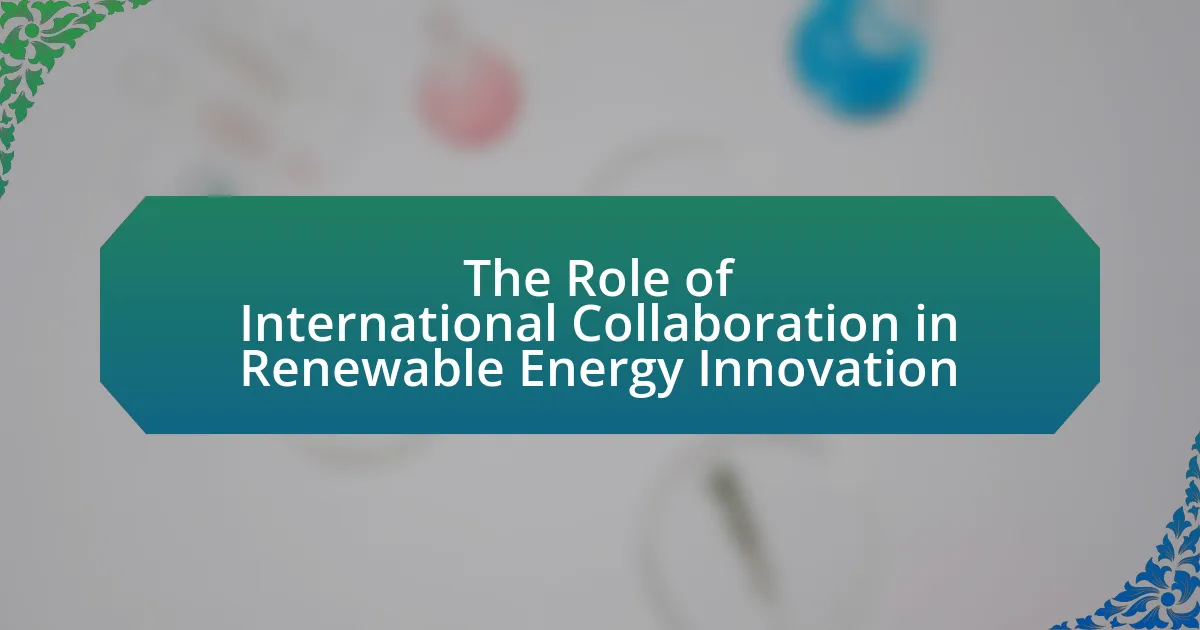Citizen Science is a collaborative approach that involves non-professionals in scientific research, particularly in the field of renewable energy. This article explores the significant role of Citizen Science in enhancing data collection, community engagement, and public policy related to renewable energy initiatives. It highlights various types of data that citizen scientists can gather, the importance of data quality, and successful examples of citizen-led projects. Additionally, the article discusses the challenges faced by these initiatives and the strategies that can be employed to promote citizen participation, ultimately demonstrating how Citizen Science contributes to advancing renewable energy technologies and fostering sustainable practices within communities.
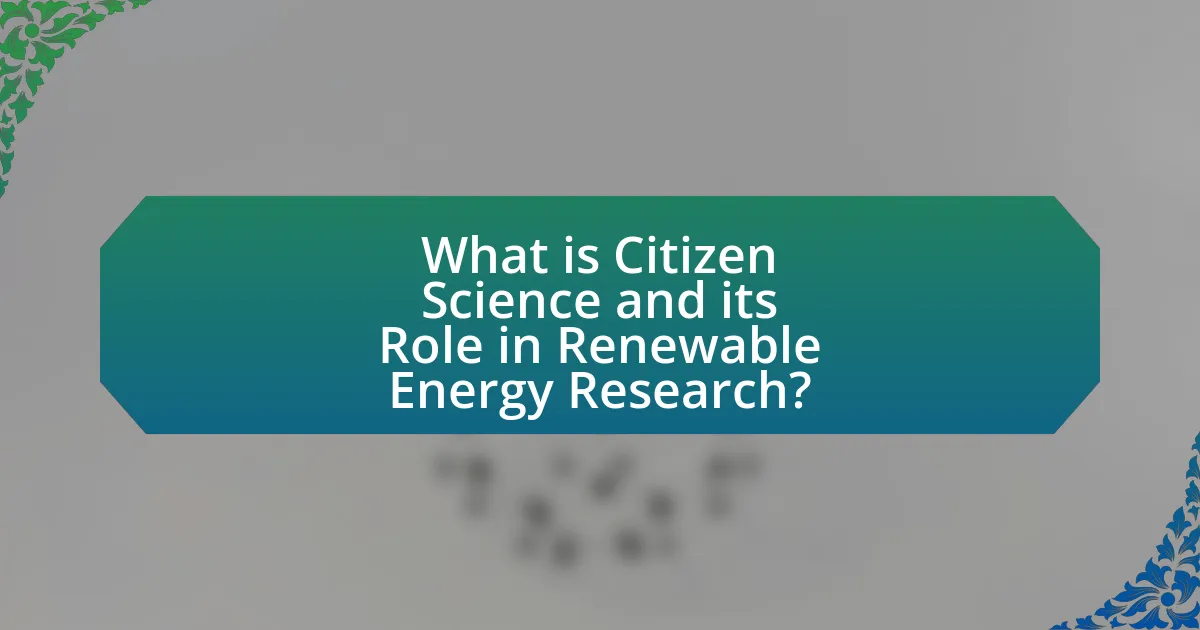
What is Citizen Science and its Role in Renewable Energy Research?
Citizen Science is a collaborative approach where non-professionals contribute to scientific research, often collecting data or analyzing results. In renewable energy research, Citizen Science plays a crucial role by engaging the public in data collection, such as monitoring local energy consumption or assessing the impact of renewable energy projects. This involvement not only enhances the volume and diversity of data collected but also raises awareness and fosters community support for sustainable energy initiatives. Studies have shown that projects like the Solar Citizen initiative in Australia have successfully mobilized community members to gather solar energy data, demonstrating the effectiveness of Citizen Science in advancing renewable energy research.
How does Citizen Science contribute to data collection in renewable energy?
Citizen Science significantly enhances data collection in renewable energy by engaging the public in monitoring and reporting environmental data. This participatory approach allows for the gathering of large datasets that would be difficult and costly for researchers to obtain alone. For instance, projects like the Solar Observing Network enable volunteers to collect solar energy data from their rooftops, contributing to a broader understanding of solar potential across different regions. Additionally, studies have shown that citizen-collected data can complement professional research, as seen in the work published by the National Renewable Energy Laboratory, which highlights the accuracy and reliability of data gathered through citizen involvement.
What types of data can citizen scientists collect for renewable energy projects?
Citizen scientists can collect various types of data for renewable energy projects, including environmental data, energy consumption patterns, and performance metrics of renewable energy systems. Environmental data may encompass temperature, humidity, wind speed, and solar radiation, which are crucial for assessing the viability of renewable energy sources. Energy consumption patterns provide insights into how energy is used within communities, helping to identify opportunities for efficiency improvements. Performance metrics of renewable energy systems, such as output from solar panels or wind turbines, allow for the evaluation of system effectiveness and reliability. These data types are essential for advancing research and development in renewable energy technologies.
How is the quality of data ensured in citizen science initiatives?
The quality of data in citizen science initiatives is ensured through rigorous protocols, training, and validation processes. These initiatives often implement standardized methodologies for data collection, which include clear guidelines and instructions for participants to follow. Additionally, many projects incorporate quality control measures such as peer review, expert validation, and cross-checking data against established benchmarks. For instance, the “eBird” project, which collects bird observation data, employs a system where experienced birders review submitted data to ensure accuracy and reliability. This structured approach helps maintain high data integrity, making the information valuable for research in fields like renewable energy.
Why is Citizen Science important for advancing renewable energy technologies?
Citizen Science is important for advancing renewable energy technologies because it engages the public in data collection and analysis, which accelerates research and innovation. By involving non-experts, Citizen Science expands the scope of data gathering, allowing for more extensive and diverse datasets that can lead to improved understanding and development of renewable energy solutions. For instance, projects like the Solar Citizen initiative have demonstrated that community involvement can enhance solar energy adoption by providing localized data on solar potential, thereby informing policy and investment decisions. This collaborative approach not only fosters greater public awareness and support for renewable energy but also drives technological advancements through the integration of grassroots insights into scientific research.
What are the key benefits of involving citizens in renewable energy research?
Involving citizens in renewable energy research enhances community engagement, increases data collection efficiency, and fosters public acceptance of renewable technologies. Citizen participation allows for diverse perspectives, leading to more comprehensive research outcomes. For instance, studies have shown that citizen science initiatives can significantly expand the scale of data collection; a report by the National Academies of Sciences, Engineering, and Medicine indicates that citizen involvement can increase the volume of data collected by up to 50%. Furthermore, when citizens are actively involved in research, they are more likely to support and adopt renewable energy solutions, as evidenced by a survey from the Pew Research Center, which found that communities engaged in renewable projects exhibit higher levels of support for local energy initiatives.
How does citizen engagement influence public policy on renewable energy?
Citizen engagement significantly influences public policy on renewable energy by fostering community support and shaping decision-making processes. Engaged citizens often participate in public consultations, advocacy campaigns, and local initiatives, which can lead to increased awareness and demand for renewable energy solutions. For instance, studies have shown that communities with active citizen participation are more likely to adopt renewable energy policies, as seen in the case of Germany’s Energiewende, where public involvement has been crucial in transitioning to renewable sources. This engagement not only helps policymakers understand public preferences but also encourages transparency and accountability in the development of energy policies.
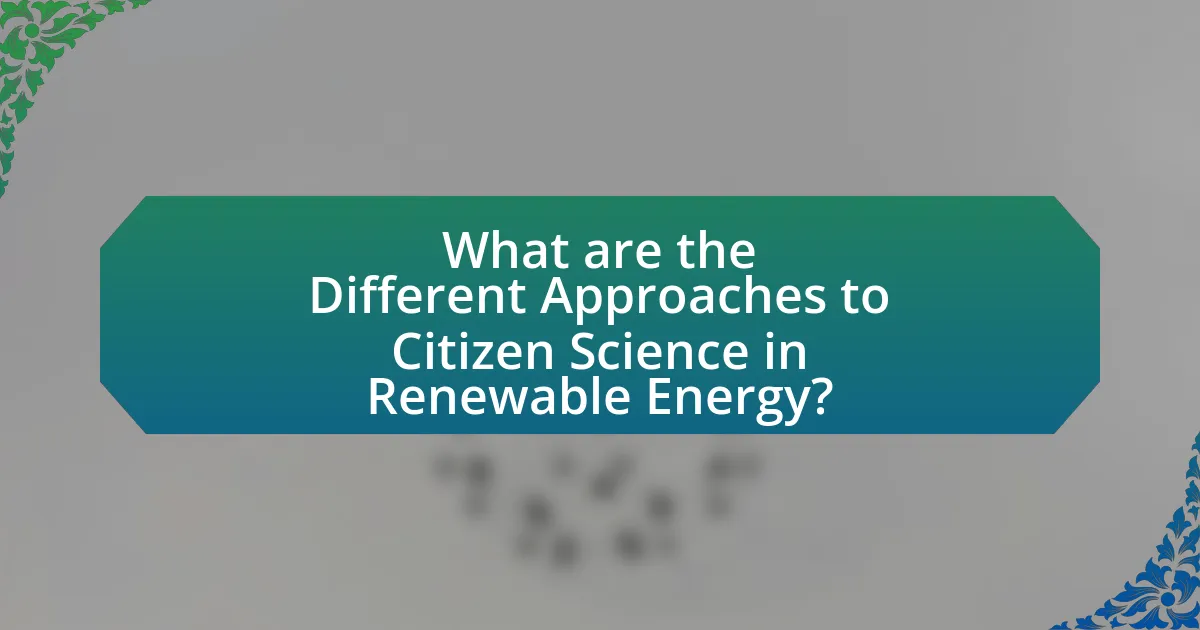
What are the Different Approaches to Citizen Science in Renewable Energy?
Different approaches to citizen science in renewable energy include participatory monitoring, data collection initiatives, and community-based projects. Participatory monitoring involves citizens actively engaging in the observation and reporting of renewable energy resources, such as wind patterns or solar radiation levels, which enhances data accuracy and local relevance. Data collection initiatives often utilize mobile applications or online platforms that allow individuals to contribute information about energy consumption or renewable energy installations, thereby creating large datasets for analysis. Community-based projects focus on collaborative efforts to implement renewable energy solutions, such as community solar farms, where citizens not only invest but also participate in the management and operation, fostering a sense of ownership and responsibility. These approaches demonstrate the effectiveness of citizen involvement in enhancing renewable energy research and implementation.
How do different citizen science projects operate within renewable energy research?
Different citizen science projects operate within renewable energy research by engaging the public in data collection, analysis, and dissemination of findings related to energy systems. For instance, projects like Solarize and the Community Energy Project involve volunteers in measuring solar panel efficiency and energy consumption patterns, thereby contributing valuable data that researchers can use to improve renewable energy technologies. These initiatives often utilize online platforms for training participants and sharing results, which enhances community involvement and fosters a sense of ownership over local energy solutions. The effectiveness of citizen science in this field is supported by studies showing that community-collected data can lead to more accurate assessments of renewable energy potential and inform policy decisions, as evidenced by the work of the Citizen Science Association, which highlights successful case studies in renewable energy applications.
What are some successful examples of citizen science in renewable energy?
Successful examples of citizen science in renewable energy include the Solar Observing Network, which engages volunteers to monitor solar energy production and contribute data to improve solar forecasting. Another example is the Crowd-Sourced Solar Mapping project, where citizens use online tools to assess solar potential in their neighborhoods, leading to increased solar installations. Additionally, the Citizen Weather Observer Program allows individuals to collect weather data that supports wind energy research, enhancing the accuracy of wind resource assessments. These initiatives demonstrate how citizen involvement can significantly advance renewable energy research and implementation.
How do these projects vary in methodology and scope?
Citizen science projects in renewable energy research vary significantly in methodology and scope, with some focusing on data collection while others emphasize community engagement. For instance, projects like Solarize engage citizens in collective solar energy installations, utilizing a community-driven approach to increase adoption rates. In contrast, initiatives such as the Global Wind Atlas rely on crowdsourced data to map wind resources, emphasizing data accuracy and technical analysis. These differences illustrate how methodologies can range from participatory action to technical data gathering, while the scope can vary from localized community efforts to global resource assessments, reflecting diverse objectives and outcomes in renewable energy research.
What challenges do citizen science projects face in renewable energy research?
Citizen science projects in renewable energy research face several challenges, including data quality, participant engagement, and resource limitations. Data quality is a significant concern, as the accuracy and reliability of information collected by non-experts can vary widely, potentially leading to flawed research outcomes. For instance, a study published in the journal “Environmental Science & Policy” highlighted that inconsistent data collection methods among citizen scientists can compromise the integrity of research findings.
Participant engagement is another challenge, as sustaining interest and motivation among volunteers can be difficult, particularly in long-term projects. Research by the University of California found that maintaining active participation often requires ongoing training and support, which can strain project resources.
Lastly, resource limitations, including funding and access to technology, hinder the scalability and effectiveness of citizen science initiatives. A report from the National Academies of Sciences indicated that many citizen science projects lack sufficient financial backing to provide necessary tools and infrastructure, ultimately affecting their impact on renewable energy research.
How can data reliability issues be addressed in citizen science?
Data reliability issues in citizen science can be addressed through rigorous training, standardized protocols, and validation processes. Training volunteers on data collection methods ensures consistency and accuracy, while standardized protocols provide clear guidelines for data entry and reporting. Additionally, implementing validation processes, such as cross-checking citizen-collected data with expert assessments or using automated quality control measures, enhances the reliability of the data. Research indicates that structured training and validation can significantly improve data quality in citizen science projects, as evidenced by studies showing that trained volunteers produce data comparable to that of professionals.
What are the barriers to participation for citizens in renewable energy initiatives?
Barriers to participation for citizens in renewable energy initiatives include financial constraints, lack of awareness, and regulatory challenges. Financial constraints often arise from the high upfront costs associated with renewable energy technologies, such as solar panels, which can deter individuals from investing. Lack of awareness about the benefits and availability of renewable energy options further limits participation, as many citizens may not understand how these initiatives can positively impact their lives and the environment. Regulatory challenges, including complex permitting processes and restrictive policies, can also hinder citizen involvement by creating obstacles that are difficult to navigate. These barriers collectively reduce the likelihood of citizen engagement in renewable energy initiatives, as evidenced by studies indicating that financial and informational gaps significantly impact participation rates.
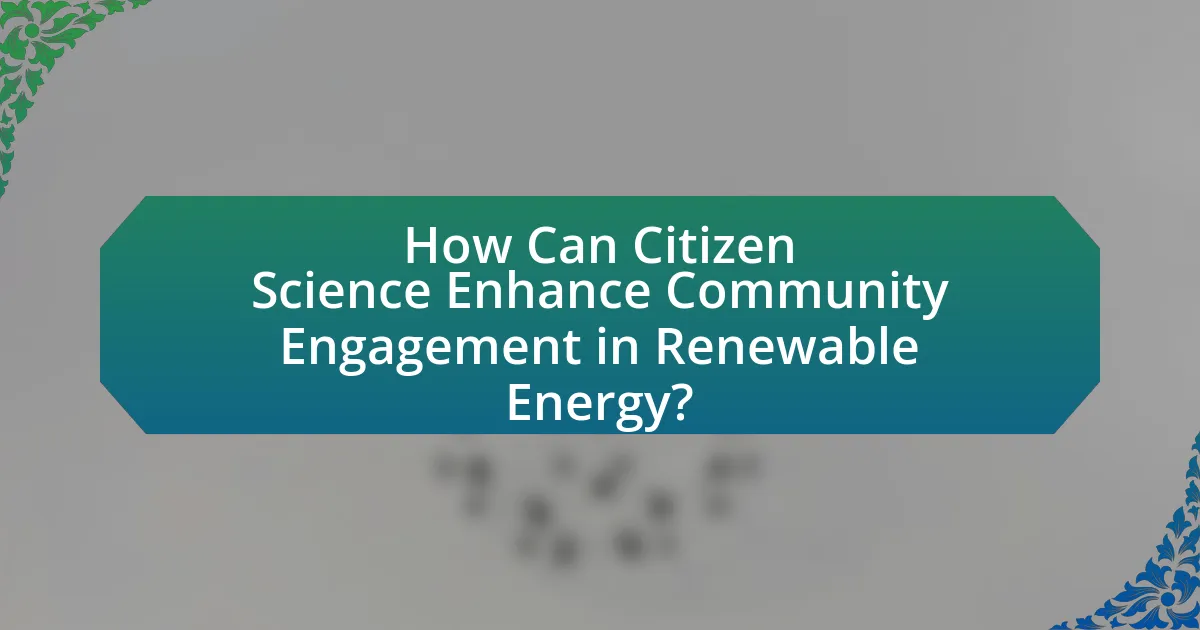
How Can Citizen Science Enhance Community Engagement in Renewable Energy?
Citizen science can enhance community engagement in renewable energy by actively involving local residents in data collection and analysis, fostering a sense of ownership and responsibility towards energy initiatives. This participatory approach not only educates community members about renewable energy technologies but also encourages collaboration among diverse stakeholders, including scientists, policymakers, and citizens. For instance, projects like Solarize campaigns have demonstrated that when communities participate in solar energy assessments, they are more likely to adopt solar technologies, leading to increased installations and awareness. Research indicates that citizen-led initiatives can result in a 20-30% increase in community participation in renewable energy projects, showcasing the effectiveness of citizen science in driving engagement and action.
What strategies can be used to promote citizen participation in renewable energy projects?
To promote citizen participation in renewable energy projects, strategies such as community engagement initiatives, educational programs, and participatory decision-making processes can be implemented. Community engagement initiatives, like public forums and workshops, allow citizens to voice their opinions and contribute ideas, fostering a sense of ownership. Educational programs that inform citizens about renewable energy benefits and technologies can enhance understanding and interest, leading to increased participation. Participatory decision-making processes, where citizens are involved in planning and implementation, ensure that their perspectives are considered, which has been shown to improve project outcomes and community support. For instance, a study by the International Renewable Energy Agency found that projects with high community involvement had a 30% higher success rate in implementation compared to those with minimal citizen engagement.
How can educational programs support citizen involvement in renewable energy research?
Educational programs can support citizen involvement in renewable energy research by providing training and resources that empower individuals to participate in data collection, analysis, and project development. For instance, programs that include hands-on workshops and online courses can teach citizens about renewable energy technologies and research methodologies, enabling them to contribute effectively. Research indicates that citizen science initiatives, such as the Solar Citizen program, have successfully engaged communities in monitoring solar energy production, demonstrating that educational outreach can lead to increased public participation and enhanced data quality in renewable energy studies.
What role do local organizations play in facilitating citizen science initiatives?
Local organizations play a crucial role in facilitating citizen science initiatives by providing resources, training, and community engagement. They often serve as intermediaries between researchers and the public, helping to recruit volunteers, organize events, and disseminate information. For example, organizations like the Citizen Science Association have documented that local groups can enhance participation by tailoring projects to community interests and needs, thereby increasing data collection efficiency and quality. Additionally, local organizations often secure funding and partnerships that support these initiatives, further amplifying their impact on renewable energy research.
What are the best practices for implementing citizen science in renewable energy research?
The best practices for implementing citizen science in renewable energy research include establishing clear objectives, engaging diverse communities, providing adequate training, ensuring data quality, and fostering collaboration with scientists. Clear objectives guide the research focus and help participants understand their roles, while engaging diverse communities enhances data collection and broadens perspectives. Adequate training equips citizen scientists with the necessary skills to collect and analyze data effectively, which is crucial for maintaining data quality. Ensuring data quality involves implementing standardized protocols and regular assessments to validate findings. Finally, fostering collaboration with scientists facilitates knowledge exchange and enhances the credibility of the research, as evidenced by successful projects like the Solar Citizen initiative, which mobilized community members to gather solar energy data, demonstrating the effectiveness of these practices in real-world applications.
How can researchers effectively collaborate with citizen scientists?
Researchers can effectively collaborate with citizen scientists by establishing clear communication channels and providing structured guidelines for participation. This approach ensures that citizen scientists understand their roles and the objectives of the research, which enhances data quality and engagement. For instance, projects like the Solar Energy Research Institute’s citizen science initiatives have demonstrated that when researchers offer training sessions and utilize user-friendly data collection tools, citizen scientists contribute valuable data that supports renewable energy research. Such collaborations have been shown to increase public interest and investment in scientific endeavors, as evidenced by the growing number of citizen science projects in the renewable energy sector.
What tools and technologies can enhance citizen science efforts in renewable energy?
Tools and technologies that can enhance citizen science efforts in renewable energy include mobile applications, data collection platforms, and remote sensing technologies. Mobile applications enable citizens to easily report data on renewable energy usage and environmental conditions, facilitating real-time data collection. Data collection platforms, such as OpenStreetMap and Citizen Science platforms like Zooniverse, allow volunteers to contribute and analyze data collaboratively, increasing the volume and diversity of information available for research. Remote sensing technologies, including satellite imagery and drones, provide high-resolution data on renewable energy resources, such as solar irradiance and wind patterns, which can be utilized by citizen scientists to improve local energy assessments. These tools collectively empower communities to engage in renewable energy research, leading to more informed decision-making and enhanced sustainability efforts.
What future trends can we expect in Citizen Science and Renewable Energy Research?
Future trends in Citizen Science and Renewable Energy Research include increased collaboration between researchers and the public, enhanced data collection through mobile technology, and a focus on local energy solutions. These trends are driven by the growing recognition of the value of community engagement in scientific research, as evidenced by projects like the Solarize campaign, which empowers communities to adopt solar energy collectively. Additionally, advancements in mobile applications and sensor technology enable citizen scientists to gather real-time data on renewable energy usage and environmental impacts, facilitating more informed decision-making. The emphasis on localized energy solutions reflects a shift towards sustainability and resilience in energy systems, aligning with global goals for reducing carbon emissions and promoting renewable energy adoption.
How might advancements in technology impact citizen science in renewable energy?
Advancements in technology significantly enhance citizen science in renewable energy by improving data collection, analysis, and collaboration. For instance, the proliferation of mobile applications and IoT devices allows individuals to gather real-time data on energy consumption and renewable energy generation, making it easier for citizens to contribute valuable information. Additionally, platforms like Zooniverse facilitate collaboration among citizen scientists, enabling them to analyze large datasets collectively, which accelerates research efforts. A study published in the journal “Environmental Science & Policy” highlights that technology-driven citizen science projects have increased public engagement and data accuracy, demonstrating the positive impact of technological advancements on renewable energy initiatives.
What emerging areas of research could benefit from citizen science in renewable energy?
Emerging areas of research that could benefit from citizen science in renewable energy include community-based solar energy projects, energy efficiency monitoring, and the development of decentralized energy systems. Community-based solar energy projects can leverage local knowledge and participation to optimize site selection and design, as evidenced by initiatives like Solarize campaigns, which have successfully engaged residents in collective solar installations. Energy efficiency monitoring can be enhanced through citizen-led data collection, allowing for real-time assessments of energy consumption patterns, as demonstrated by projects like the EnergyHub initiative, which empowers users to track and reduce their energy use. Additionally, decentralized energy systems, such as microgrids, can benefit from citizen science by incorporating local input and data to improve resilience and sustainability, as seen in research conducted by the National Renewable Energy Laboratory, which highlights the importance of community engagement in energy transition efforts.
What practical steps can individuals take to get involved in Citizen Science for Renewable Energy?
Individuals can get involved in Citizen Science for Renewable Energy by participating in local projects, contributing data through mobile apps, and joining community organizations focused on renewable energy initiatives. Engaging in local projects allows individuals to collaborate with researchers and contribute to data collection efforts, such as monitoring solar panel efficiency or tracking wind patterns. Using mobile apps like iNaturalist or OpenStreetMap enables individuals to gather and share environmental data that can inform renewable energy research. Additionally, joining organizations such as the Citizen Science Association or local environmental groups provides access to resources, training, and networking opportunities that enhance participation in renewable energy projects. These steps not only contribute to scientific research but also foster community awareness and action towards sustainable energy solutions.
